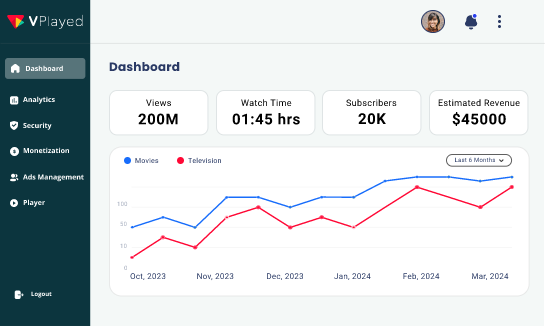Stream and Grow Your Live Streaming Platform With 1000+ Features & 10+ Revenue Models.
Request a Free Demo5 Best Ways to Monetize Live Streaming Content in 2025
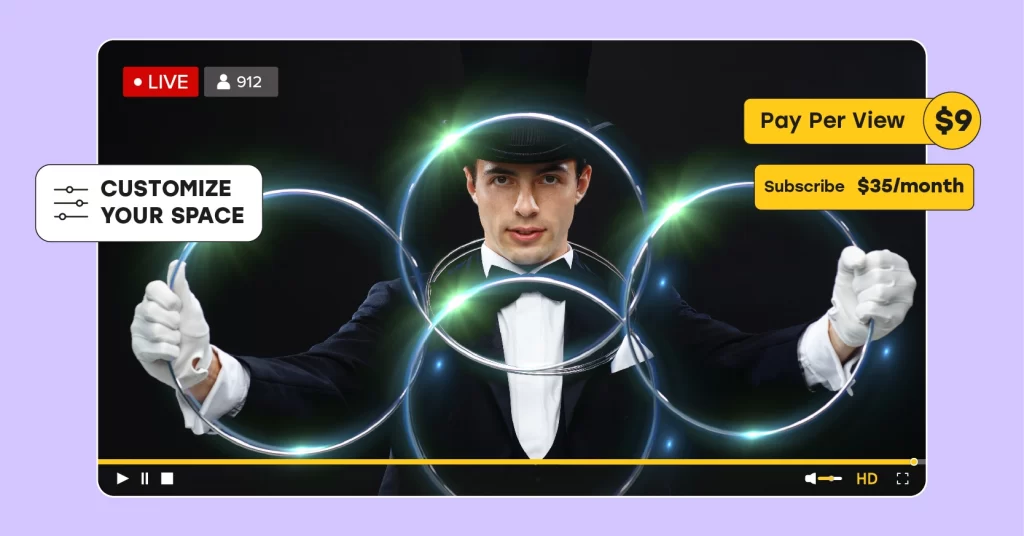
Live streaming is all the trend in the content monetization space over the last decade. Live-streamed videos have become ubiquitous due to several key factors.
Firstly, the proliferation of high-speed internet and mobile devices has democratized live streaming platform monetization for content owners of all sizes.
Secondly, Social media platforms like Facebook, YouTube, and Twitch have incorporated live streaming features, thus expanding its reach.
Lastly, and more importantly, the rise of influencer culture has encouraged individuals to share their real-time experiences.
Every genre has a dedicated audience base, from entertainment and education to fitness and sports.
According to a PwC survey, 68% of consumers said they prefer live streams that allow them to interact with the presenter or other viewers.
And according to Technavio, the global live-streaming market will grow to $3.21 billion in 2027 at a compound annual growth rate (CAGR) of 21.2%.
It is evident that the live-streaming market for live streaming is all set to increase exponentially.
So, let’s understand what live-streaming monetization is, why it is important, and how to monetize your video content and live-streamed videos now.
- Fully Customizable
- Lifetime Ownership
- On-Premise/On-Cloud
- 100% White-label
- Zero Revenue Share
- Hire Dedicated Developers
Table of Contents
What is Live Streaming Monetization?
Live streaming monetization is the process of helping businesses, content creators to make money from live video broadcasts with their content in a live streaming platform over the internet.
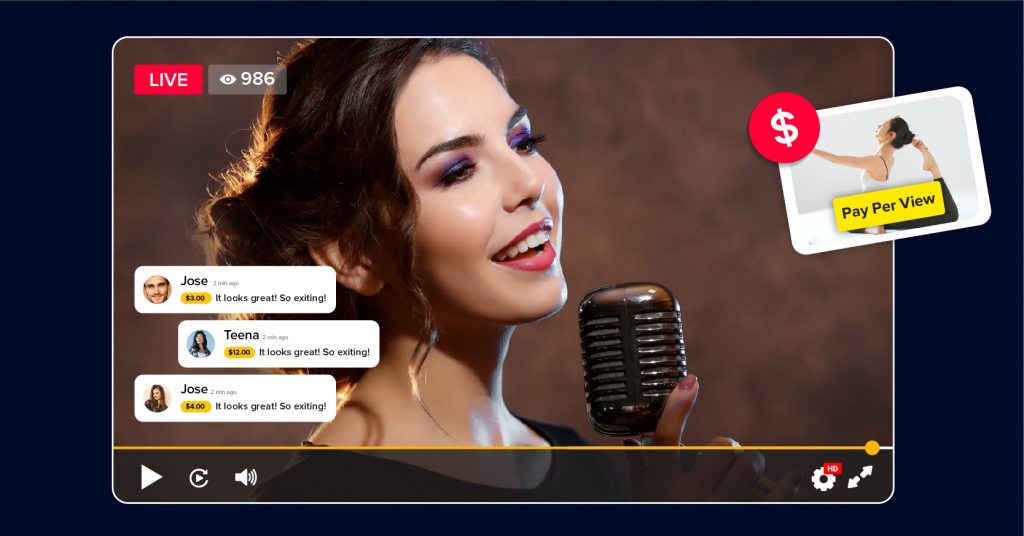
It’s like setting up a way for them to earn cash while they share live videos with their audiences.
Let’s take a religious organization, say a church, as an example.
A church can leverage live-streaming monetization to raise funds by offering various services to its congregation.
They can implement a subscription model where members pay a monthly fee for exclusive access to live-streamed religious services, Bible studies, or special events.
This subscription typically includes features like on-demand access to previous sermons or downloadable study materials.
Additionally, the church can accept donations in real time during live streams. This also allows members to contribute during virtual tithes or offerings.
And that’s not everything. A church can also sell virtual tickets for special events or concerts, with viewers gaining access to these events via their paid tickets.
Let’s take another example of a fitness studio.
A vast number of people — particularly homemakers — find it difficult to hit the gym or go to workout sessions regularly.
They can be readily turned into customers with something that is more accessible. And also this offers an excellent business opportunity.
Now, a fitness studio or a fitness guru can monetize its live-streamed workouts by offering tiered membership options.
They might have a free tier with basic access to live classes and also a premium tier with exclusive content, personalized coaching, and interactive features to clear fitness and workout related doubts.
They can also charge monthly or annual subscriptions for premium access.
Live Streaming Monetization – What Are the Benefits for Creators and Audiences?
Live streaming platforms with monetization offer a win-win situation for all stakeholders involved.
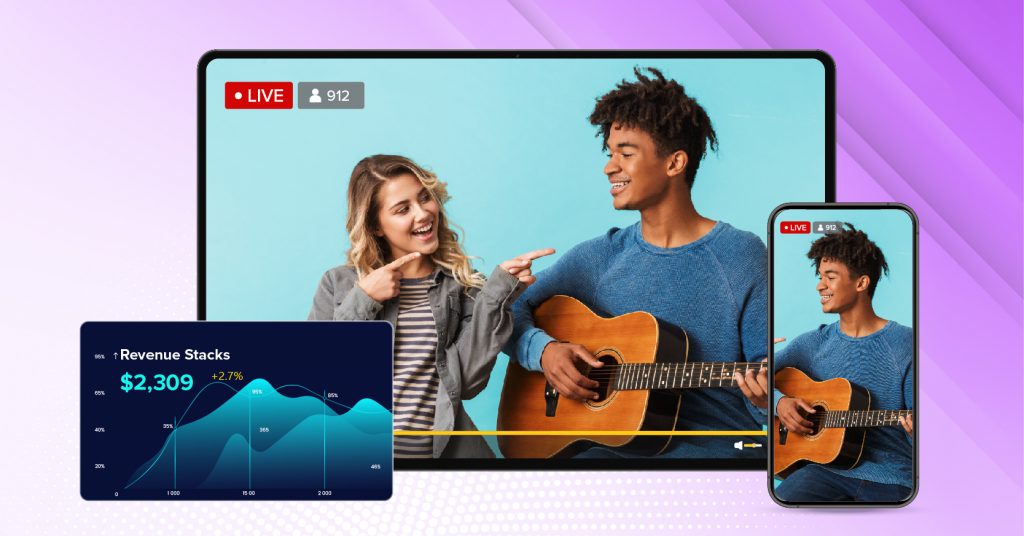
Benefits For Content Creators
- Financial Sustainability: Monetizing your live streams provides a reliable and steady income source. It allows content creators and also owners to focus on their craft without having to worry about the financial woes.
- Improved Content Quality: Earnings from Live Streaming monetization can be reinvested to upgrade equipment, enhance production values, and deliver better-quality content. For instance, you can start streaming live content with whatever you have and upgrade your gadgets over time.
- Better Audience Interaction: Monetization incentivizes content creators to engage with their audience more actively, creating a stronger sense of community and enhancing your audience base.
- Innovation and Diversity: Financial stability enables creators to explore new content ideas and diversify their offerings, attracting a wider audience. This helps build a diverse set of new audiences.
- Long-term and Sustainable Growth: Successful live streamers can turn their business into a full-time career that is sustainable and rewarding. For instance, a Yoga school in the United States witnessed 321% growth in learners after they started monetizing their live streams with a dedicated platform.
- Access to Free Content: Many live streams remain free to watch, meaning audiences can enjoy high-quality content without subscription fees., This helps them bring in new subscribers.
- Enhanced Viewing Experience: Live Streaming Monetization helps content creators invest in better equipment, improving video and audio quality for viewers.
- Tailored Content: Live streaming monetization encourages creators to cater to their audience’s preferences, producing more engaging and relevant content.
- Direct Interaction: Paid features like subscriptions often give viewers direct access to creators, fostering a closer connection.
- Community Growth: Monetization supports content creators in building larger and more active communities, offering audiences a sense of belonging. For example, a Brazilian fitness platform grew its subscribers by ~278% and built a massive fitness community under its brand.
Different Live Streaming Monetization Models That You Need To Know in 2025
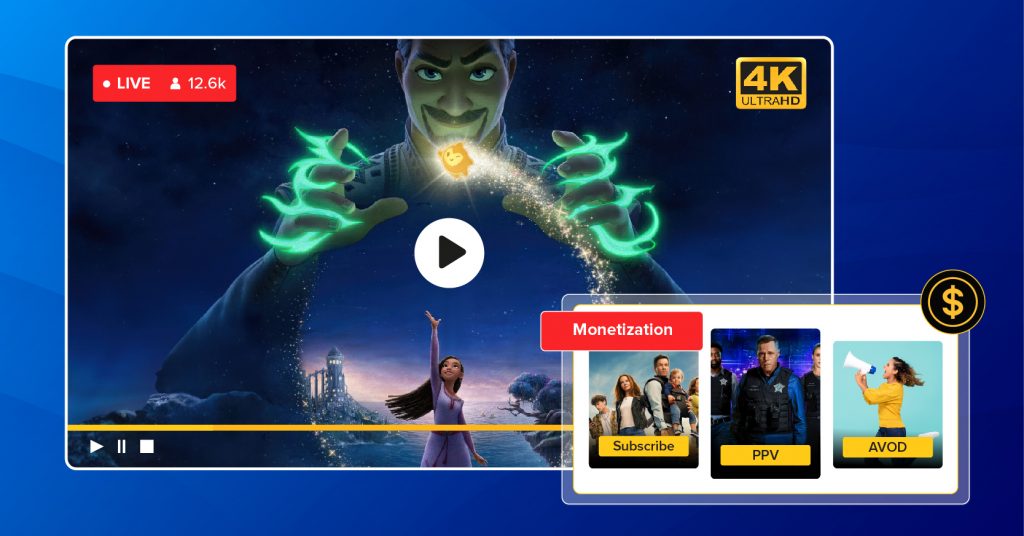
1. PPV (Pay-Per-View)
In this model, viewers pay a one-time fee to access a specific live stream or event. Pay per view is often used for exclusive content like sports events, concerts, or conferences.
This allows content creators to spawn revenue from
2. Subscriptions
Content creators offer different subscription tiers with varying benefits — ad-free viewing, exclusive content, or badges.
And subscribers typically pay a recurring fee (monthly or annually) to access these perks, providing creators with a consistent and reliable income stream.
3. Advertisements
Creators earn money by displaying ads (pre-roll, mid-roll, & display ads) during their live streams.
Revenue is generated based on ad views, clicks, or ad engagement. It is a common model for free content as it doesn’t require direct payment from viewers.
Looking To Build Your Own Live Streaming Platform?
Start and Grow Your Video Streaming Service With 1000+ Features & 10+ Revenue Models.
 Highly Customizable
Highly Customizable Life Time Ownership
Life Time Ownership Own 100% of Your Revenue
Own 100% of Your Revenue
 Full-Branding Freedom
Full-Branding Freedom
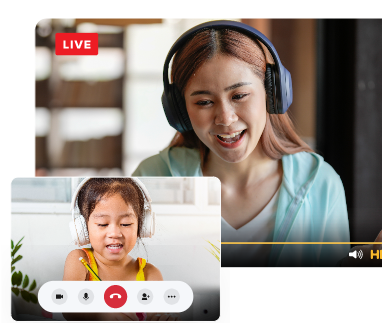
4. Donations
Viewers can voluntarily contribute money during live streams to support content creators.
Donations can be one-time or recurring, often accompanied by on-screen shoutouts or acknowledgments.
This is common in religious broadcasts, such as a church live streaming services, where viewers can support through donations.
5. Hybrid Model
Content creators can combine multiple monetization methods to diversify their income stream.
For example, offering a mix of subscriptions, pay-per-view events, and also accepting donations provides flexibility and potentially higher earnings from a broader range of viewers.
How to Choose the Right Monetization Strategy for Your Business?
Choosing the right monetization strategy is crucial because it directly impacts your business’s revenue and long-term sustainability.
Consider the following factors to make an informed decision.
1. Audience Demographics
Knowing your audience deeply involves understanding their age, interests, geographic location, and online behavior.
For instance, a younger audience may be more receptive to in-app purchases or virtual goods in mobile games.
However, an older audience might prefer subscribing to ad-free streaming services like Netflix.
2. Content Type
The choice between monetization methods depends on your content.
For instance, a tech tutorial channel might offer premium, in-depth courses behind a paywall, while an entertainment platform might rely on ads for revenue, providing free, general content.
3. Competition
Examine competitors within your niche. If you’re launching a new streaming service, offering a unique blend of content unavailable elsewhere can be a differentiating factor.
For example, Disney+ entered the market with exclusive access to its extensive Disney, Marvel, and Star Wars content library.
4. Right Streaming Platform and Technology
Some platforms, like YouTube, enable creators to monetize through ads and channel memberships, while others, like Patreon, focus on direct fan support.
However, dedicated live streaming platforms like VPlayed with robust live streaming solution offer unparalleled flexibility with customization of features and 10+ monetization models to make money from every avenue possible.
In addition, VPlayed offers a live to VOD solution, allowing you to seamlessly convert live streams into video-on-demand content, providing lasting engagement with your audience and more monetization opportunities.
VPlayed supports all major and minor payment gateways worldwide to facilitate easy payments from your audience.
5. User Experience
Striking a balance between monetization and a seamless user experience is vital.
For example, most creators often place non-intrusive ads at the beginning or during natural breaks in their videos, minimizing disruption to viewers.
Achieve user experience by understanding user behavior through real-time analytics features offered by platforms like VPlayed.
6. Engagement and Loyalty
Encourage engagement by offering perks to paid subscribers or by acknowledging the top donors during live streams.
Patreon, for example, allows creators to offer exclusive content or access to a community forum to foster a sense of belonging.
7. Scalability
Ensure that your monetization method can accommodate a growing audience. Platforms like VPlayed allow creators to scale seamlessly across platforms.
Enhance your scalability with the right platform to ensure seamless user experience, as scalability results in enhancing revenue.
8. Legal and Regulatory Compliance
Be aware of your region’s privacy laws, advertising regulations, and tax obligations.
For instance, content creators in the European Union must adhere to the General Data Protection Regulation (GDPR) guidelines when handling user data.
By carefully evaluating these factors, you can select a monetization strategy that aligns with your business goals, audience, and content.
Remember, ultimately, it’s about providing more value to your users’ time and effort.
Conclusion
So, monetization of live streaming is more potent and impactful than you would have imagined.
After all, it presents many opportunities for content creators and also businesses to thrive in the digital age.
However, relying solely on third-party platforms can present practical challenges, from revenue sharing to limited customization options.
This is where VPlayed’s dedicated live-streaming platform shines. With a self-hosted solution, we put you in the forefront of the control of your content and also monetization strategy.
VPlayed also offers 100% customization — ensuring your platform fits your unique use case and branding.
- Request Demo Book a Live, Personalized Demo
- Contact Sales Reach Out to Our OTT Experts
Frequently Asked Questions(FAQ):
Live streaming is real-time broadcasting of events as they occur. The technology allows individuals and businesses to share video content instantly over the internet.
Viewers can engage with the content as it happens — say live chat during a football game — fostering a sense of immediacy and interaction.
Live streaming brings many benefits for content creators. It offers a direct and authentic connection with audiences. It promotes real-time engagement, boosts audience interaction, and provides a platform for immediate feedback. Additionally, it extends the reach of the content and allows for multifarious content creation.
You can monetize live-streaming content with subscriptions, real-time advertisements, pay-per-stream, and virtual gifts. Content creators can also explore sponsorships, merchandise sales, and exclusive content offerings to generate additional income.
To successfully monetize live-streaming content, focus on building a loyal audience, offering valuable and engaging content, and diversifying revenue streams. In addition, you can utilize viewer donations, implement effective ad placement, and leverage sponsorship opportunities. Consistency, quality, and audience interaction are critical elements for sustainable monetization.
The future of monetizing live video streaming lies in creating personalized and interactive experiences. We can expect continued growth in subscription-based models, augmented reality integrations, and the rise of virtual events. The use of blockchain and NFTs for content ownership and monetization could also play a significant role in shaping the future landscape.
